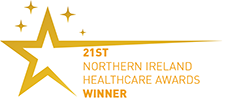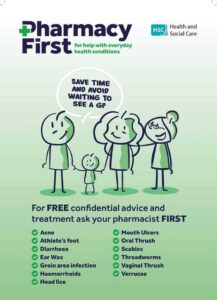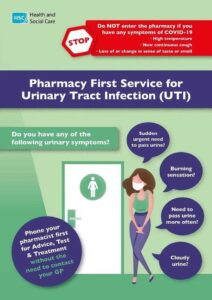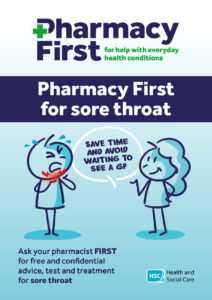Pharmacy First
Minor Ailments Scheme
The Minor Ailments Scheme is to enable patients to get free advice and medicine (if appropriate) for a defined list of illnesses from a pharmacist, without needing a GP prescription. The Pharmacist will ask about your symptoms, your medical history and other medicines that you take. This will help them make an appropriate recommendation for treatment. In some cases the pharmacist may need to refer you to another Healthcare professional such as your GP.
Please see list of conditions below that can be treated under the Minor Ailments Scheme:
- Acne Vulgaris
- Athlete’s foot
- Acute Diarrhoea
- Ear Wax
- Groin area infection
- Haemorrhoids
- Head lice
- Mouth Ulcers
- Scabies
- Threadworms
- Vaginal Thrush
- Verrucae
The Minor Ailments scheme CANNOT treat:
- Pregnant patients
- Those who have tried an OTC treatment which has not worked
- Immunocompromised patient
Pharmacy First for Urinary Tract Infection (UTI)
If you are female and aged between 16 and 64 you can be assessed and treated for Urinary Tract Infection symptoms in the majority of community pharmacies without having to wait for a GP appointment.
Pharmacy First for Emergency Hormonal Contraception (the morning after pill)
If you are aged 13 or older, you can now get the morning after pill free from community pharmacies across Northern Ireland.
Pharmacy First for Sore Throat (selected pharmacies)
The Pharmacy First Service for sore throat will be offered in 42 community pharmacies across Northern Ireland from November 2023 to March 2024.
Anyone over the age of four with a sore throat can access the service in a participating pharmacy.
See below list of Participating Pharmacies in the Derry Area:
Belmont Pharmacy, Da Vinci’s Complex, Culmore Road, Derry, BT48 8JBBoots,
Crescent Link Retail Park, Derry, BT47 6SA
Medicare Pharmacy, 6A Beechmount Avenue, Strabane, BT82 9BD
Murphy’s Pharmacy, 165 Spencer Road, Derry, BT47 6AH
Self Care
Did you know that 10 of the most minor ailments seen by GPs can also be treated by you at home?
By treating yourself at home you could save a trip to the surgery and free up time for the GPs to see patients with more serious health problems.
Read about some of the most effective home treatments on the NHS website for:
- Back pain https://www.nhs.uk/conditions/back-pain/
- Sore throat https://www.nhs.uk/conditions/sore-throat/
- Heartburn and Acid reflux https://www.nhs.uk/conditions/heartburn-and-acid-reflux/
- Diarrhoea and vomiting https://www.nhs.uk/conditions/diarrhoea-and-vomiting/
- Constipation https://www.nhs.uk/conditions/constipation/
- Migraines https://www.nhs.uk/conditions/migraine/
- Coughs https://www.nhs.uk/conditions/cough/
- Acne https://www.nhs.uk/conditions/acne/
- Sprains and strains https://www.nhs.uk/conditions/sprains-and-strains/
- Headaches https://www.nhs.uk/conditions/headaches/
Antibiotics
Each year 25% of the population visit their GP for a respiratory tract infection (eg sinus, throat or chest infection). These are usually caused by viruses.
For patients who are otherwise healthy, antibiotics are not necessary for viral infections.
These infections will normally clear up by looking after yourself at home with rest, plenty of fluids and paracetamol.
Ear infections typically last 4 days
89% of cases clear up on their own
A sore throat typically lasts 7 days
40% of cases clear up after 3 days and 90% after 7 days without antibiotics
Sinusitis typically lasts 17 days
80% clear up in 14 days without antibiotics
Cough/bronchitis typically lasts 21 days
Antibiotics reduce symptoms by only 1 day
Antibiotics only work for infections caused by bacteria.
Taking unnecessary antibiotics for viral infections should be avoided because they may not be effective next time you have a bacterial infection.
Patients with long-term conditions such as asthma, diabetes and COPD are eligible for flu and pneumococcal vaccinations. Ask at reception for more information.
Medicine cabinet
You can treat many minor ailments such as colds, coughs and indigestion by keeping a well-stocked medicine cabinet at home.
We suggest you keep the following:
- Paracetamol and aspirin (children under 16 and people with asthma should not take aspirin)
- Mild laxatives
- Anti-diarrhoeal medicines
- Rehydration mixture
- Indigestion remedy (for example, antacids)
- Travel sickness tablets
- Sunscreen – SPF15 or higher
- Sunburn treatment (for example, calamine)
- Tweezers and sharp scissors
- A thermometer
- A selection of plasters, non-absorbent cotton wool, elastic bandages and dressings
Remember:
- Keep the medicine chest in a secure, locked place out of reach of small children
- Always read the instructions and use the suggested dose
- Watch expiry dates – don’t keep or use medicines past their sell-by date
- Take all unwanted and out-of-date medicines back to the pharmacy
Other NHS services
As well as our practice, there are many other local NHS services you can contact for health advice, information or treatment.
You can ask your local pharmacist about lots of health issues, including when to visit your GP. And there’s no need for an appointment.





